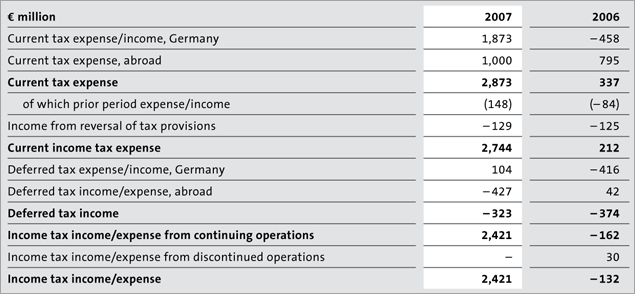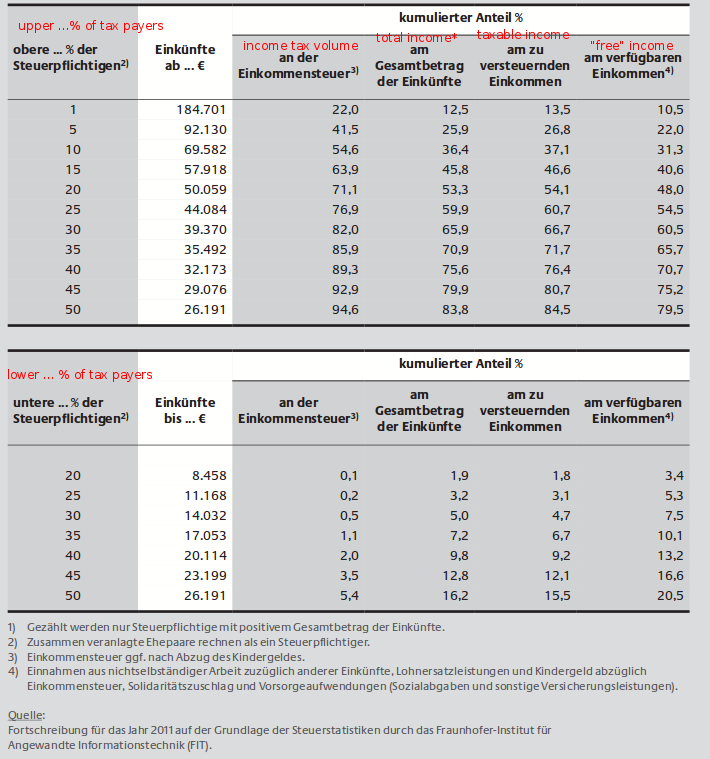How To Germany Paying Taxes in Germany
Post on: 21 Апрель, 2016 No Comment

Updated — January 2015
Know your status, both here and in your homeland.
Expatriates living in Germany can be subject to German taxes, especially if they have German source income. The German tax system is similar to the structures in other western countries. You pay income taxes throughout the year, usually with an employer deducting tax from each paycheck. Adjustments are then made at the end of the year for possible under or overpayments.
Individual Income Taxes
For 2014 and 2015 a taxable income of less than €8,354 is tax-free for a single person (€16,708 for a married couple). Incomes up to €52,882 for a single person (105,764 for a couple) are then taxed with a rate progressively increasing from 14% to 42%. Incomes from 52,882 (105,764) up to 250,730 (501,460) are taxed at 42%. Incomes over 250,731 for a singe person and 501,462 for a married couple are taxed at 45%. In addition to this there is the solidarity surcharge of 5.5% of the tax, to cover the costs of integrating the states of the former East Germany.
As in many other countries, Germany allows a variety of deductions that can lower taxable income. Deductions are granted for circumstances such as children under 18 (or under 27 if still attending school and without earnings), specified insurance premiums, charitable and political contributions to German entities up to certain limits and unavoidable extraordinary expenses above a certain limit (such as illness).
Deductions from compensation are also made for four social programs; retirement, unemployment, health insurance and long-term nursing care. Payments for these programs are normally borne equally by the employer and the employee. The employer’s share of contributions is not considered as taxable income to the employee and the employee’s portion is tax deductible up to a certain limit. A tax adviser can tell you more about other deductions and the requirements to earn them. For more information go to our article on German Social Security and Employee Benefits .
If an individual is subject to German tax, generally most sources of income are then taxable. The Lohnsteuer (wage tax), which alone accounts for a third of the German government’s revenue, is withheld at source from compensation. Income from other sources (e. g. self-employment, fees for services, rent collections, investments and the like) are covered by the Einkommensteuer (income tax).
The Lohnsteuer differs from the Einkommensteuer only by the method of collection. The Lohnsteuer is collected at source and paid directly to the Finanzamt (tax office) by the employer while the individual must pay the Einkommensteuer himself.
Based primarily on your final payment for the previous year, the Finanzamt will estimate your tax for the current year and require you to make prepayments (Vorauszahlungen ) of a quarter of the tax on March 10, June 10, September 10 and December 10. The total tax liability is determined by filing an income tax return, which includes all types of income from all sources. Wage tax withholding as well as provisional payments are deducted from this total tax liability so that a refund or final tax payment is assessed. The tax assessment is usually issued by the Finanzamt between two and six months from the date the return is filed. No payment will be due before receipts of the tax assessment notice.
Every tax return is under audit, therefore if the tax assessment is issued and is not preliminary, the assessment can only be changed in the future by the occurrence of extraordinary circumstances (e. g. tax evasion).
As a rule, the income tax return (Einkommensteuererklrung ) should be filed by May 31 of the year following the one in which the income was received. If you use the assistance of a tax consultant, you have an automatic extension to file until September 30. There may be penalties and interest assessed if the return is filed late.
There are a few situations where the taxpayer is required to pay taxes even though the income is less than the personal allowance, especially when tax-exempt income (such as foreign-sourced income) must be considered for the determination of the applicable income tax rate (progression clause). Taxes are then assessed based on a sliding scale.
There is an unofficial tax calculator available online that can give you an idea of what your Einkommensteuer or Lohnsteuer might be.

Click here for the calculator. This should take you to the Wage Tax Calculator. Click on the top right for the Income Tax Calculator.
Other Taxes
In addition to the various forms of income tax there is also a series of sales taxes that significantly impact both individuals and businesses. The major tax is the Mehrwertsteuer (value added tax), which accounts for a quarter of the government’s revenue and is second only to the Lohnsteuer in this regard. The Mehrwertsteuer assesses a levy on each step in the production and delivery of most items available for purchase. It applies to services as well as goods and the standard current rate is 19%. A reduced rate of 7% currently applies to certain products, including food and printed material. Medical and insurance services are generally exempt, as are exports of goods abroad and services rendered abroad.
Numerous other items, including gasoline, alcoholic beverages, tobacco products, tea and coffee, carry sales taxes in addition to the Mehrwertsteuer. There is also a church tax (Kirchensteuer ), of 8% to 9% of the Einkommensteuer/Lohnsteuer. But you are not required to pay the tax unless you wish to be officially affiliated with one of Germany’s established churches; usually Catholic or Protestant (Evangelisch ).
All in all there are approximately 30 different types of taxes, including taxes on inheritances, real estate and motor vehicles. There is even a tax on the gross amounts received by the state-run lotteries, though the distributions to the lucky lottery winners are tax-free.
Getting Help/More Information in English
Due to the complexity of the German tax system, it is always recommended that you hire a tax consultant (Steuerberater ) to guide you through the intricacies involved in filing returns as well as to provide some ease of mind during your stay abroad. In addition, the German Finanzamt will give you tax advice at no charge. If you are interested in further information in English about the German tax system, the Bundeszentralamt fr Steuern has information on their website at this link. Also, you can download their English language information brochure (updated in August 2013) on the entire German tax system here .














